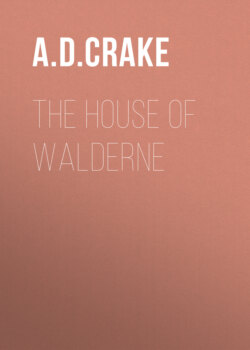Читать книгу The House of Walderne - A. D. Crake - Страница 7
На сайте Литреса книга снята с продажи.
ОглавлениеExcept the Lord build the house,
their labour is but vain that build it.
Except the Lord keep the city,
the watchman watcheth but in vain.
And again:
Lo, children and the fruit of the womb
are an heritage and gift that cometh of the Lord.
The two boys whom he had so strangely adopted came to the mind of the earl; they were not of his blood, yet they might be "an heritage and gift of the Lord." And as the psalms rose and fell to the rugged old Gregorian tones--old even then--their words seemed to Simon de Montfort as the voice of God.
Oh! how rough, yet how grand that old psalmody was! Modern ears call its intervals harsh, its melodies crude, but it spoke to the heart with a power which our sweet modern chants often fail to exercise over us, as we chant the same sacred lays.
Nightfall--night hung like a pall over the island, over the moat, over the silent heath and woods; the snow kept falling, falling; the fires kept blazing in the huge hearths; and the bell kept tolling until curfew time, by the prior's order, that if any were lost in the wild night they might be guided by its sound to shelter.
The earl slept soundly in his little monastic cell that night, and in the morning he perceived the light of a bright dawn through the narrow window; anon the winter's sun rose, all glorious, and the frost and snow sparkled like the sheen of diamonds in its beams. The bell was just ringing for the Chapter Mass, the mass of obligation to all the brotherhood, and the only one sung--during the day--in contradistinction to the low, or silent, masses--which equalled the number of the brethren in full orders, of whom there were not more than five or six.
The earl, his squire, and the two boys were there. The prior was celebrant. The manner of Hubert showed his distraction and indifference: it was like a daily lesson in school to him, and he gave it neither more nor less attention. But to Martin the mysterious soothing music of the mass, like strains from another world, so unlike earthly tunes, came like a new sense, an inspiration from an unknown realm, and brought the unbidden tears to his young eyes.
It must not be supposed that he was totally ignorant of the elements of religion; even the wild inhabitants of the forest crave some form of approach to God, and from time to time a wandering priest, an outlaw himself of English birth, ministered to the "merrie men" at a rustic altar, generally in the open air or in a well-known cavern. The mass in its simplest form, divested of its gorgeous ceremonial but preserving the general outline, was the service he rendered; and sometimes he added a little instruction in the vernacular.
What good could such a service be to men living in the constant breach of the eighth commandment? the Normans would ask. To which the outlaws replied, we are at open war with you, at least as honourable a war as you waged at Senlac.
And his mother saw that little Martin was taught the simple truths and precepts of Christianity; more she asked not; nor at his age did he need it.
But here was a soil ready for the good seed.
The weather continued fine, so after mass the earl and his squire started for Lewes, taking the two boys with him, Hubert and Martin. That night they were the guests of John, Earl of Warrenne {5}, who, although he did not agree with the politics of Simon de Montfort, could not refuse the rites of hospitality.
On the morrow, resuming their route, they left the towers of Lewes behind them as they pursued the northern road. Once or twice the earl turned and looked behind him, at the castle and the downs which encircled the old town, with a puzzled and serious expression of face.
"Stephen," he said to his squire; "I cannot tell what ails me, but there is an impression on my mind which I cannot shake off."
"My lord?"
"That yon castle and those hills, which I seem to have seen in a dream, are associated with my future fate, for weal or woe."
